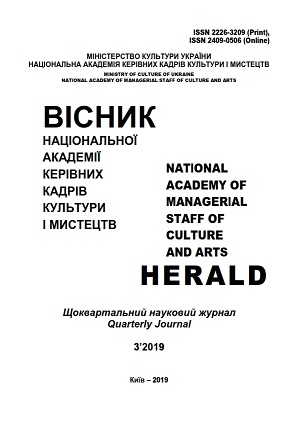Когнітивні інновації культури як ризик посткультурної стагнації
Cognitive Culture Innovation Understood as a Risk of Post-Culture Stagnation
Author(s): Marуna Oleksandrivna ProtasSubject(s): Social Philosophy, Culture and social structure , Social development, Sociology of Culture, Globalization, Sociology of Art
Published by: Національна академія керівних кадрів культури і мистецтв
Keywords: post culture; art crisis; cognitive innovation; culture industry;
Summary/Abstract: The purpose of the article is to study lasting since the last century and penetrating even into the educational systems of universities crisis processes of the global post culture and to determine the dangers of those culture-industrial intentions of modernizing the artistic consciousness, where creative personalities are turned into servile nomenclature of the culture industry‘s market strategies. Methodology: structural and typological analysis of cultural phenomena, common in the humanities since the 1970s, has been synthesized with the poly-systemic trans-disciplinary ―world-system analysis‖ method introduced by Immanuel Wallerstein. The scientific novelty: avoiding the traps of the reified logic of postmodernism, the author discusses the alarming situation in culture and art as a consequence of global cultural inversion provoked by humanity‘s technical and technological breakthrough, which led to the denial of traditional spiritual values and their replacement by rational concepts. Relying on a significant corpus of criticism of the phenomena of post culture by Western and domestic analysts, the author proves the fallacy of the failure of modern humanitarian theories and practices to incorporate the traditions of the aesthetic experience of the past, which is cultivated by current contemporary innovations on a planetary scale. Conclusions. To overcome the global cultural and art crisis, it is necessary to have a critical attitude towards the strategies of desacralized logomachy that suffers from information fever because information is not a condition of aesthetic experience, and imitating technological reasoning destroys creative intentions. Therefore, the majority of contemporary art projects, being interesting manifestations of social, political and economic problems of society, are not related to еру transcendentally aesthetic sphere of art.
Journal: Вісник Національної академії керівних кадрів культури і мистецтв
- Issue Year: 2019
- Issue No: 3
- Page Range: 321-324
- Page Count: 4
- Language: Ukrainian

